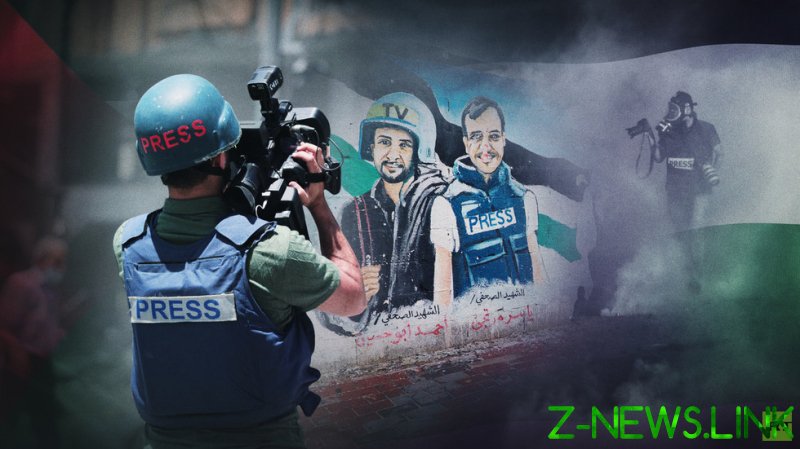
Reporters in Gaza are struggling to do their jobs with severely limited internet access, and a fuel shortage which prevents them from moving around. They are working in constant danger from airstrikes, which have claimed more than 10,000 lives so far.
It’s been more than a month since Hamas militants infiltrated Israel in the deadliest attack on the Jewish state since its inception in 1948.
More than 1,400 Israelis were brutally murdered on October 7, and over 7,000 were wounded. In retaliation, Israel waged war on Hamas, vowing to kill all those responsible for the massacre. It also promised to uproot the Islamic movement, which has been ruling Gaza since 2007.
For the past five weeks, Israel has been pounding Gaza, home to 2.3 million of people, with thousands of bombs. The death toll in the Palestinian coastal enclave has exceeded 10,000. Thousands are still under the rubble and unaccounted for. Among those killed are Palestinian journalists. According to the latest data, at least 40 have lost their lives in the current wave of violence. RT spoke with two men reporting from Gaza to gauge their opinions on the conflict and what it’s like to work under fire. One of them, Rami Almughari, is a veteran in the field. The other, Mansour Shouman, is a newcomer to the profession, but both described the fear and constant smell of death that accompany their work.
RT: First of all, tell us about your backgrounds.
Rami: I have been in this business for more than two decades, and during my career I have done print, radio and TV. I have reported for Al Monitor and the New Arab, for Channel News Asia, and for RT. I have also taught at Gaza universities. Throughout those years I made sure not to affiliate myself with any political faction. I am an independent journalist and will remain such.
Mansour: I am not coming from this field. I have a degree in engineering and a masters in business from Canadian universities. For the past 17 years I have been working in the field of manufacturing and management of supply chains, oil and gas, as well as consulting. I was introduced to journalism only four weeks ago, when the war erupted and when there was a need for English speakers, who could help get the voices of 2.3 million Gazans out to the world.
RT: Tell us what it’s like to report in wartime. How difficult and how dangerous is it? Do you feel that being a reporter turns you into an immediate target?
Rami: I can tell you that working as a journalist definitely puts you at risk. You keep moving from one item to another, you talk to people, you visit destruction sites so you are more exposed. I don’t think journalists are being singled out or intentionally targeted. Everyone is in danger, everyone needs to take precautions but journalists are more vulnerable, because by the nature of their work, they are more exposed.
In the past I can tell you journalists linked to Hamas have been targeted and killed. In 2021, Israel raided an apartment of one journalist who was linked to the group and who was working for the local radio. I can’t say that this is what’s happening now. But the intensive strikes make everyone vulnerable, and it seems that Israel is trying to send a message that we should refrain from going out, so as not to be targeted.
Also, this war is more challenging than anything else we have experienced so far. There is no fuel, so people need to either move on foot or use donkeys and horses. Very often there is no electricity or connection to the internet or mobile services, so getting information out has been a challenge. But we keep on doing our duty, there is no other way.
Mansour: It has been extremely challenging to function as a reporter, and it is also very dangerous. The mere fact that you are working as a journalist may put your life at risk and we know that some 46 reporters have already been killed in their homes and offices. Also, don’t forget the Al Jazeera journalist Shereen Abu Aqleh, who was killed by them in cold blood in 2022. My feeling is that Israel targets journalists intentionally, as part of their scare tactics to prevent information from spreading. So they cut communication services, and target those who report on the situation. But I am a strong believer in God, and I believe that I need to continue to do the right thing, which is getting the news out to the general public.
RT: Take us to the first moments after the war started. Where were you, and did you have an urge to leave, or did you want to stay and report what was going on?
Rami: It was 6.30am and I was awoken by the sounds of heavy shelling. I immediately started getting myself updated on the situation, and when my friends and acquaintances asked me what was going on, I remember I told them that was a khalika – Arabic for destruction, elimination. I immediately realized it was an unprecedented escalation. But I didn’t have any urge to flee, I felt I needed to stay and report. First I made sure that my family was safe, but after that was done I went to the studios and started reporting. On my way there, I saw the panic and fear on people’s faces. I noticed that cars were scarce, as people were leaving or hiding. Many were confused, worried and scared. I was reporting for several days from the office as it was a safer place than home. Then, when the media company I was working with evacuated to the south for fear of their safety, and our paths parted, I decided to use my basic equipment, including a phone and a microphone, to do stories and interview people.
Mansour: We woke up at 6.30am to the sound of rockets and strikes and we didn’t know what was happening. A few hours later when the videos started emerging, we realised that something big would happen and that it would have an impact not only on us in Gaza but also on the entire world.
As I told you earlier, before the war, I was not a journalist. I was a family man and a consultant, and my initial urge was to leave, but soon we realised that it was not possible. The Rafah crossing was closed, so I stayed to tell the story. Now I see it as my religious, national and humanitarian obligation.
RT: As a journalist you have seen many terrifying and emotional scenes. What was the most memorable so far?
Rami: For me the scariest thing was back in 2021, when I went to interview a family who had lost their house. I was completely sure that that area was safe, as it had already been bombed and had nothing else to destroy. But while we were there, the area was struck again, and only by miracle I and my crew remained alive.
Mansour: I think the scariest experience so far was when the first missiles started hitting Gaza. They bombed our local mosque, which is located only 100 meters away from the house. The explosion shattered the house. The windows were shaking. It was the real first taste of war. Another thing that hurt me was to see a child looking at his parents and telling them to wake up, it was time to go home. Little did he know that both of them were long dead.
RT: Have you lost anyone in this round of hostilities?
Rami: One of the airstrikes that took place some three weeks ago hit a residential building where my aunt lived. She died at the age of 61 along with many other members of my extended family. Although the rescue operation is still ongoing, many of those who died are still under rubble and cannot be reached. On another occasion my 27-year-old cousin, who was walking on the street, died when the jets attacked a residential building. These strikes are sudden and nobody can anticipate when they can happen. Death is literally everywhere.
Mansour: My extended family are not in Gaza, all of them are in Jerusalem, where I am originally from. But my wife’s family is in Gaza, and she has several cousins who have been injured or who have lost their homes. My children have also lost classmates from school.
By Elizabeth Blade, RT Middle East correspondent
© 2023, paradox. All rights reserved.





